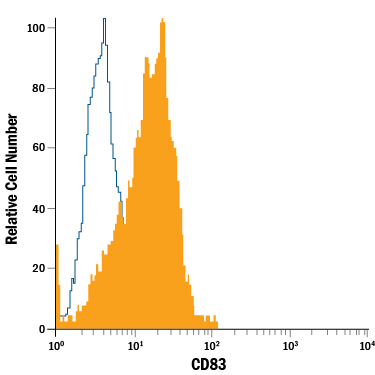Human CD83 Fluorescein-conjugated Antibody Summary
Applications
Please Note: Optimal dilutions should be determined by each laboratory for each application. General Protocols are available in the Technical Information section on our website.
Scientific Data
 View Larger
View Larger
Detection of CD83 in Human CD14+Monocyte-derived Dendritic Cells by Flow Cytometry. Human CD14+monocyte-derived dendritic cells were stained with Mouse Anti-Human CD83 Fluorescein-conjugated Monoclonal Antibody (Catalog # FAB1774F, filled histogram) or isotype control antibody (Catalog # IC002F, open histogram). View our protocol for Staining Membrane-associated Proteins.
Reconstitution Calculator
Preparation and Storage
- 12 months from date of receipt, 2 to 8 °C as supplied.
Background: CD83
Human CD83 is a 40‑50 kDa member of the Siglec (or sialic-acid-binding immunoglobulin-like lectin) family of transmembrane proteins (1, 2, 3). CD83 is synthesized as a type I transmembrane glycoprotein that contains a 125 amino acid (aa) extracellular region, a 22 aa transmembrane segment, and 39 aa cytoplasmic domain. It contains one V type Ig-like domain in the extracellular region with no inhibitory cytoplasmic motif(s). Although in vitro studies suggest CD83 may form membrane-bound covalent homodimers, in vivo this does not appear to be the case (1, 4). In the extracellular region, mouse and human CD83 are 66% aa identical (1, 2, 4, 5). Relative to human, mouse CD83 is 11 aa shorter in its extracellular domain and is expressed as a 30‑35 kDa protein (1, 4, 5). Human CD83 is active in the mouse system (4). One alternate splice form has been reported. This leads to a small monomeric soluble form of 74 aa that includes aa 20‑52 and aa 164‑205 (6, 7). In human, proteolytic cleavage and solubilization of CD83 has also been suggested, and this could lead to dimeric circulating CD83 (4, 6). CD83 is a primary marker for dendritic cells (3, 6, 8). It is also found on B cells (6, 9), neutrophils (10), monocytes and macrophages (11). Except for dendritic cells, CD83 expression is often transient. CD83 binds to sialic acids on target cells (12). Membrane CD83 appears to promote T cell proliferation, particularly of CD8+ cytotoxic T cells (13, 14). Soluble CD83, however, appears to be immunosuppressive and blocks T cell activation (15, 16). On monocytes, CD83 is suggested to drive monocytes into a fibrocyte phenotype (13). A lack of membrane-expressed CD83 leads to an unusual IL-4/IL-10 producing CD4+ T cell phenotype (17).
- Zhou, L-J. et al. (1992) J. Immunol. 149:735.
- Kozlow, E.J. et al. (1993) Blood 81:454.
- Fujimoto, Y and T.F. Tedder (2006) J. Med. Dent. Sci. 53:85.
- Lechmann, M. et al. (2005) Biochem. Biophys. Res. Commun. 329:132.
- Berchtold, S. et. al. (1999) FEBS Lett. 461:211.
- Hock, B.D. et al. (2001) Int. Immunol. 13:959.
- Dudziak, D. et al. (2005) J. Immunol. 174:6672.
- Velten, F.W. et al. (2007) Mol. Immunol. 44:1544.
- Cramer, S.O. et al. (2000) Int. Immunol. 12:1347.
- Yamashiro, S. et al. (2000) Blood 96:3958.
- Cao, W. et al. (2005) Biochem. J. 385:85.
- Scholler, N. et al. (2001) J. Immunol. 166:3865.
- Scholler, N. et al. (2002) J. Immunol. 168:2599.
- Hirano, N. et al. (2006) Blood 107:1528.
- Kotzor, N. et al. (2004) Immunobiology 209:129.
- Zinser, E. et al. (2006) Immunobiology 211:449.
- Garcia-Martinez, L.F. et al. (2004) J. Immunol. 173:2995.
Product Datasheets
Citation for Human CD83 Fluorescein-conjugated Antibody
R&D Systems personnel manually curate a database that contains references using R&D Systems products. The data collected includes not only links to publications in PubMed, but also provides information about sample types, species, and experimental conditions.
1 Citation: Showing 1 - 1
-
Lactobacillus reuteri Surface Mucus Adhesins Upregulate Inflammatory Responses Through Interactions With Innate C-Type Lectin Receptors
Authors: KP Bene, DW Kavanaugh, C Leclaire, AP Gunning, DA MacKenzie, A Wittmann, ID Young, N Kawasaki, E Rajnavolgy, N Juge
Front Microbiol, 2017-03-07;8(0):321.
Species: Human
Sample Types: Whole Cells
Applications: Flow Cytometry
FAQs
No product specific FAQs exist for this product, however you may
View all Antibody FAQsReviews for Human CD83 Fluorescein-conjugated Antibody
There are currently no reviews for this product. Be the first to review Human CD83 Fluorescein-conjugated Antibody and earn rewards!
Have you used Human CD83 Fluorescein-conjugated Antibody?
Submit a review and receive an Amazon gift card.
$25/€18/£15/$25CAN/¥75 Yuan/¥2500 Yen for a review with an image
$10/€7/£6/$10 CAD/¥70 Yuan/¥1110 Yen for a review without an image



